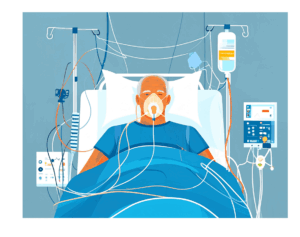Module 4 – Distributing Scarce Resources
Ethics Case 4.2
Determining When to Continue with Care
Dr. Georgia is the attending physician in the intensive care unit (ICU). One of her patients, Mr. Green, has a medical history of hypertension, atrial fibrillation, mitral valve repair, chronic kidney disease, and two failed kidney transplants. He recently developed kidney failure, which then progressed to shock and heart failure, requiring continuous dialysis and ICU care. In addition to receiving dialysis, his ICU care involves a tracheostomy attached to a ventilator for maintaining an adequate level of oxygenation, and a percutaneous endoscopic gastrostomy (PEG) tube to supply artificial hydration and nutrition.
 Very early into his admittance, Mr. Green began to show signs of intensive care unit delirium and refused surgical interventions. As Mr. Green became increasingly delirious, Mrs. Green, who was present in the ICU, was informed that her husband likely had limited time left. Upset at the news, Mrs. Green left the room and refused to further participate in the discussion. Four days later, after taking time to process the news, Mrs. Green agreed to another meeting with the ICU team. In the meeting, she insisted on the continuation of intensive medical care. “Why does everyone keep talking about the negative?” she said. “My husband has always been a fighter and I know he can fight this, too. We can’t just give up on him.”
Very early into his admittance, Mr. Green began to show signs of intensive care unit delirium and refused surgical interventions. As Mr. Green became increasingly delirious, Mrs. Green, who was present in the ICU, was informed that her husband likely had limited time left. Upset at the news, Mrs. Green left the room and refused to further participate in the discussion. Four days later, after taking time to process the news, Mrs. Green agreed to another meeting with the ICU team. In the meeting, she insisted on the continuation of intensive medical care. “Why does everyone keep talking about the negative?” she said. “My husband has always been a fighter and I know he can fight this, too. We can’t just give up on him.”
Mrs. Green then raised the possibility of her husband receiving a left ventricular assist device (LVAD), a partially implanted medical device that temporarily acts as an artificial heart. Mrs. Green explained that her father had received an LVAD when he was dying from chronic heart failure, and that the device had likely extended her father’s life by six months. Dr. Georgia knows that although these devices were originally meant for patients awaiting heart transplants, they are sometimes used in end-stage heart failure patients who do not qualify for a new heart. Unfortunately, these devices are also quite costly and in limited supply.
As Mr. Green’s ICU stay progressed, he developed multiple ulcers all over his body and became largely unresponsive, except for occasionally crying out when touched or moved. He also developed gangrene of the leg and genitals. Given this, Mrs. Green is informed that her husband is not a good candidate for an LVAD. Dr. Georgia explains that even if he survived the operation, he would be at increased risk of further infection and his body would continue to deteriorate.
Given his decline and concerned that the current level of care was no longer benefitting Mr. Green, Dr. Georgia had multiple conversations with Mrs. Green about pulling back on or stopping her husband’s medical care. Mrs. Green was told that continuing with the life-support measures wouldn’t help her husband to recover, and that his body would continue to shut down no matter what therapies they tried. Mrs. Green responded saying “I believe in miracles, and everyone in the church is praying for him,” while continuing to push for aggressive care.
Dr. Georgia believes that Mr. Green is suffering greatly from continued intensive medical care, and she knows that medical resources keeping Mr. Green alive could be used more effectively elsewhere. While continuing the life-support measures would prolong Mr. Green’s life, his prognosis and quality of life (and possibly his experience of death) will not improve. One possibility would be to leave Mr. Green attached to the ventilator but to withhold all other care, including the artificial nutrition and hydration. If this care were withheld, Mr. Green would likely die within a week. However, it is foreseeable that his suffering would increase during this final week. Another option would be for Dr. Georgia to remove Mr. Green from life-support by removing the ventilator, knowing he would die shortly thereafter (anywhere from a few minutes to a few hours). Dr. Georgia thinks continuing with Mr. Green’s care is inappropriate, but she’s concerned about going against the wishes of Mrs. Green. Feeling extremely conflicted, Dr. Georgia calls for an ethics consultation.

